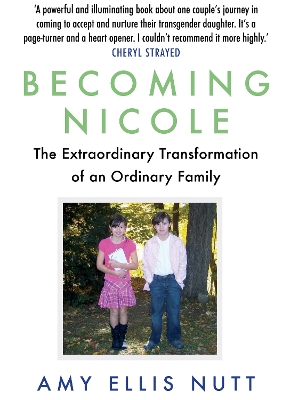Wayne and Kelly Maines adopted identical twin boys at birth. They were named Jonas and Wyatt. Starting around age 2, Wyatt started showing a strong preference for stereotypically female toys, clothes, and activities. He started asking about why people thought he was a boy.
I did enjoy the discussion of prenatal development that attempt to explain how identical twins can turn out so differently. Different positioning in utero can influence the availability of hormones to each twin, for example.
Mrs. Maines accepted what Wyatt was trying to tell her at an early age but Mr. Maines did not.
This section of the book was frustrating for me to listen to because there seemed to be so much misogyny involved. It seemed like the reason that Mr. Maines fought this for so long and so hard is that he had a hard time with a son of his preferring female things over male things. The book talks about how he wanted to play sports and hunt with his sons. Well, a girl child could do those things also. That was never mentioned. It was either there was going to be a rough-and-tumble boy or a sweet little princess girl. For a book about trans issues, the discussion of gender roles seemed very inflexible.
Wyatt's classmates didn't have a problem with any of this through elementary school. When it came time for middle school, the decision was made after talking to teachers, doctors, and counselors to have a legal name change to Nicole and to let her wear feminine clothing to school. This more public acknowledgement of Nicole's transgender identity started to become controversial.
A Maine anti-LGBT group got involved in protesting against her. A grandfather of another student in the school told his grandson that if he ever saw Nicole go into the girls' bathroom, he was to follow her in there because he had every right to be in there too.
It always comes down to the bathrooms. Why is that?
It makes me wonder if I've been using public restrooms wrong this whole time. Are we supposed to be getting naked and cavorting around the stalls? What do people imagine is going on?
Amazingly, the "logic" always seems to go like this:
- Letting transgender people use the bathroom they identify with is the same as letting any random person choose any bathroom they feel like going into on any given day.
- So, cis heterosexual men will take advantage of this opportunity to go into women's restroom where (we must presume) they are imagining naked women lining up for their perusal.
- This will lead to rape.
So, if I'm following the logic correctly, all we can fix all this and still let transgender people go to the bathroom in peace. All we need to do is:
- Make cis heterosexual psychosexually disturbed men use a private restroom of their own --- and ----
- Teach these same men not to rape people
Problem solved! Notice that nowhere in here are transgender people a public hazard AT ALL.
Anyway, instead of using my logic, the school district banned Nicole from the girl's restroom and made her be monitored by an adult at all times. This was supposed to be for her safety to keep the other student who was harassing her away but it punished her instead of dealing with his harassment. After trying to work out a solution, the Maines moved and filed suit against the district.
The lawsuit worked its way up to the Maine Supreme Court where they finally won a ruling that kids in school in Maine are allowed to use a restroom that conforms to their gender identity.
I finished this audiobook a few days before HBO released The Trans List, which includes an interview with Nicole. In this trailer, she is youngest woman who is talking about bathrooms. I watched the documentary. It is very good. It is only an hour long so if you have access to it you should definitely watch.
This review was originally posted on Based On A True Story
